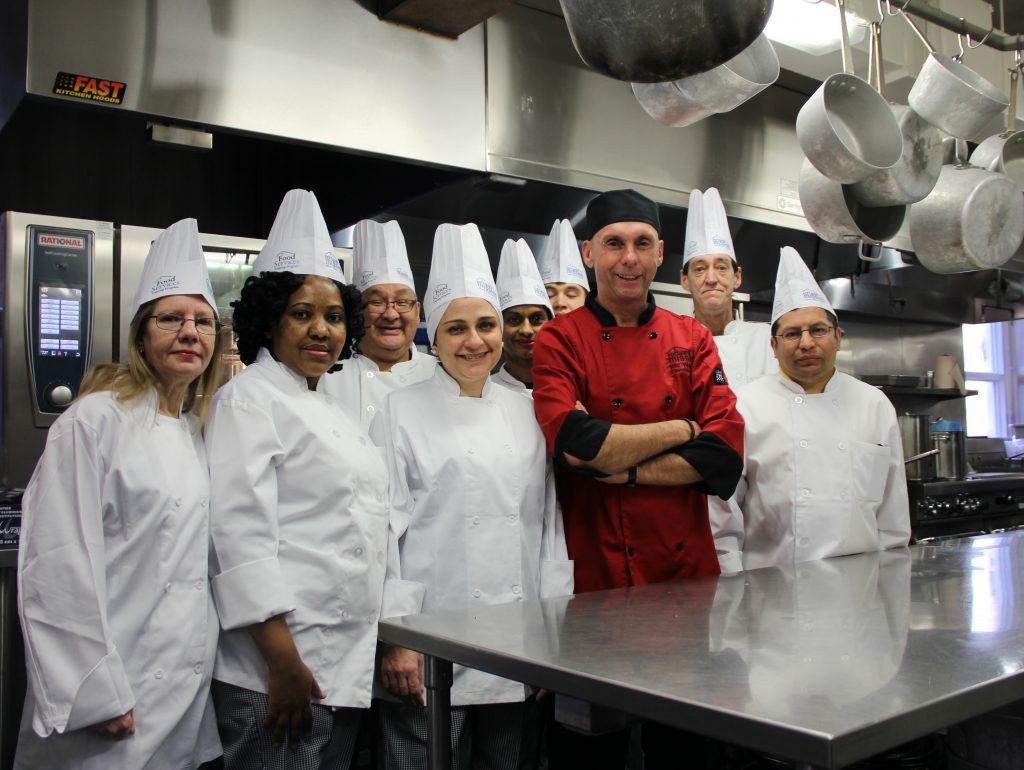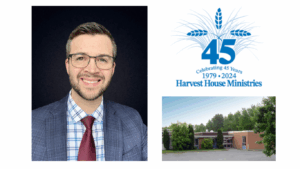What does your social enterprise do?
The Food Service Training Program (FSTP) teaches applicants the skills and knowledge needed to work in a commercial kitchen. Training includes courses in knife skills, theory, WHMIS, health and safety, Food Handler’s Certification and first aid/CPR. But it’s about much more than teaching people how to cook. Applicants must demonstrate only one qualification – a desire to change their lives for the better. Students graduate with not only a credential, but also newfound confidence, pride and dignity.
As part of the FSTP, we run a commercial catering business to provide additional training opportunities for students and to generate revenues which are reinvested into the program. Events range from private parties and weddings to larger affairs such as catering for Parliament Hill. We also provide catering services to other not-for-profits.

Where are you located and when did you start?
The FSTP began in 2004 and is currently located at The Ottawa Mission at 35 Waller Street. The Mission is planning to move the program offsite to be able to expand the program to meet the need within the community. (Currently the Mission has to turn away applicants due to lack of space and lack of capacity.)
What was the inspiration behind creating the social enterprise?
The program builds self-esteem and confidence, which are fundamental to success in any career. When I was young, a co-worker took me under his wing and saved my life. That’s why this program exists: he showed me how to change your life through food. So that’s how we support students to change their lives. We empower them through unconditional support.
Tell us about the people you serve? How do they typically find you?
Many of the students have endured significant hardship in their lives, including family violence and neglect, serious health conditions, transition to a new country, and other challenges. For many, this will be their first graduation into any form of higher education or training. Students sometimes hear about the program while having a meal here through the community meal program, or are told about the program through another agency or partner program.
Demand for Mission catering is strictly through word-of-mouth. There is no website currently but one will be introduced later this year. Even without this visibility, catering revenues have grown from just under $64,000 when it was first introduced to more than $400,000 annually.
How has CSED helped you?
CSED helped us to develop a solid business plan to actualize this expansion, as well as secure potential donors to support the project. We are very grateful to CSED for this assistance, which has provided a solid foundation for moving forward.
What challenges do you face day to day?
The FSTP started in 2004 with 5 students. Since then, 163 students have graduated and 152 have founds jobs by the time they graduate, a success rate of 93%. The course has expanded to include more training opportunities such as catering and job placements. We have outgrown our space and ability to keep up with the number of people that want to take part. Within our current facility, we have more than doubled the number of graduates, but nonetheless we still to turn applicants away.
What are some of the lessons you and your team have learned along the way?
While working with students, many of whom are very vulnerable based on their past experiences and backgrounds, we’ve learned to be as patient and supportive as possible so they stick with the program and optimize their chance of success for a better future.
What is your vision moving forward?
We will increase the number of students trained annually at a non-profit, offsite FSTP education centre. By creating this centre, we will expand our quality training to provide more students the skills required to work in the culinary field. We will keep records on graduates by doing follow-up. By adding a website, we will increase catering revenue that will support the programs’ operation. We will also sell healthy prepared meals at an affordable price for people that normally cannot afford it.
What makes you most proud?
Seeing applicants develop a sense of pride and dignity as they progress through the program. Many students enter this program lacking in self-confidence. As they move through the program, we show them that we believe in them, so they begin to believe in themselves. When they receive their diplomas at graduation, we are proud of them, and they have newfound pride in themselves.
What keeps you up at night?
Knowing how many prospective students who want to change their lives for the better we have to turn away because we currently lack the capacity to accept them into the program. This program was created to help people and we hate turning away people who want help.
How can CSED help you further?
We look forward to continuing to work with CSED to benefit from its expertise in coaching and assistance in implementing our expansion plan to secure potential donors as well as marketing the program to optimize knowledge of the program within the community.



